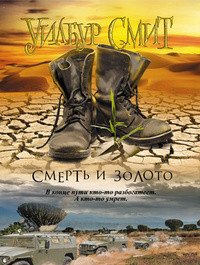Men of Men - Smith Wilbur (книги бесплатно без txt) 📗
The barracks of the fighting regiments were deserted.
Two thousand dead on the Shangani, three thousand more at Zembesi, and nobody would ever count those who had crawled away to die like animals in the caves and thickets.
The survivors had scattered, some to join the women in the hills, the others to cower, bewildered and demoralized, wherever they could find shelter.
Of all the fighting impis of Matabele, only one remained intact, the Inyati regiment of Induna Gandang, the king's half-brother. Gandang alone had been able to resist the madness of hurling his men over open ground at the waiting Maxim guns, and now he waited for his king's orders in the hills just north of the royal kraal with his impi gathered about him.
In all of Gubulawayo, there was one small group remaining. Twenty-six of these were white men and women. They were the traders and concession-hunters who had been at the kraal when Jameson had marched from Iron Mine Hill. With them, were the Codrington family, Clinton and Robyn and the twins. Lobengula had ordered them all to remain under his protection, while the impis were out in battle array, and now he had called them to the goat kraal for his last audience.
Drawn up before the two new brick-built houses which had replaced the great thatched hut, were Lobengula's four Cape wagons with the teams already in the traces.
About the wagons were a small party of the royal retainers: two of the king's senior wives, four elderly indunas, and a dozen or so slaves and servants.
The king himself sat on the box of the leading wagon.
in that wagon were all Lobengula's treasures, a hundred big tusks of ivory, the little sealed pots of uncut diamonds, and the canvas bags stencilled with the name "The Standard Bank Ltd" containing the sovereigns paid to him during the four years since he had granted the concession to the British South Africa Company, four thousand sovereigns, less than a sovereign for every one of his dead warriors.
Around the wagon were gathered the white men, and Lobengula looked down upon them. The king had become an old man in the few short weeks since he had thrown the war spear on the Hills of the Indunas. There were deep lines of sorrow and espair carved around his mouth and eyes. His eyes were rheumy and shortsighted, his hair bleached silver-grey, his body bloated and misshapen, and his breathing was racked and irregular like that of a dying animal.
"Tell your queen, white men, that Lobengula kept his word. Not one of you has been harmed," he wheezed.
"Daketela and his soldiers will be here tomorrow. If you go out upon the eastern road, you will even meet them before nightfall." Lobengula paused and sed to catch his breath, then went on. "Go now. There is nothing more I have to say to you."
They were silent, subdued, and strangely chastened, as they trooped out of the goat kraal. Only Robyn and her family remained.
The twins stood on each side of Robyn. At twenty-one years of age, they were as tall as she. it seemed that the three of them were sisters, for they all had the clear eyes and glossy hair of healthy young women.
Clinton Codrington, standing behind them, stooped and bald, dressed in sober broadcloth that was mossy green with age and shiny at the cuffs and elbows, seemed father to Robyn as well as to the twins.
The king looked down upon them with a terrible regret.
It is the last time that you will make my eyes glad, Nomusa," he said.
oh King, my heart is on fire for you. I think of what has happened and how I advised you."
Lobengula held up his hand to silence her. "Do not torture yourself, Nomusa. You have been a true friend of many years, and what you did was done in friendship.
Nothing you or I could have done would have changed the manner of it. It was the prophecy; it was as certain as the fall of the leaves from the msasa trees when the frosts are on the hills."
Robyn ran forward to the wagon, and Lobengula stooped to take her hand.
"Pray to your three gods that are one god for me, Nomusa."
"He will hear you, Lobengula, you are a good man."
"No man is all goodness or all evil," the king sighed.
"Now, Nomusa, soon Daketela and his soldiers will be here. Tell him that Lobengula says thus. "I am beaten, white men, my impis are eaten up. Let me go now, do not hunt me further, for I am an old sick man. I wish only to find a place where I may mourn my people, and at last die in peace."
"I will tell them, Lobengula."
"And will they listen, Nomusa?"
She could not face him, and she dropped her eyes. "You know they will not listen."
"My poor people," whispered Lobengula. "Will you look after my poor people when I am gone, Nomusa?"
"I swear it to you, oh King," Robyn said fiercely. "I will stay at Khami Mission until the day that I die, and I will devote my life to your people."
Then Lobengula smiled, and once again there was a flash of the old mischievous twinkle in his eye.
"I give you the royal permission which I denied you all these years, Nomusa. From this day forward any of my people, man or woman or child of Matabele who wish to pray with you, you may pour water on their heads and make the cross of your three gods over them."
Robyn could not reply.
"Stay in peace, Nomusa," said Lobengula, and his wagon rumbled slowly out through the gates of the stockade.
Clinton Codrington reined in the mule on the crest of the rise above the royal kraal, and he groped for Robyn's hand. They sat silently on the seat of the little Scotch cart, watching the last pale shreds of dust thrown up by the king's wagons disappearing away in the north across the grassy plain.
"They will never leave him in peace," Robyn said softly, "Lobengula is the prize," Clinton agreed. "Without him, Jameson and Rhodes will have no victory."
"What will they do with him!"she asked sadly. "If they catch him."
"Exile, certainly," Clinton said. "Sint Helena Island, probably. It's where they sent Cetewayo."
"Poor tragic man," Robyn whispered. "Caught between two ages, half savage and half civilized man, half cruel despot and half a shy and sensitive dreamer. Poor Lobengula."
"Do look, Papa!" Vicky called suddenly, pointing down the rude track towards the east. There was a thick column of dust rising above the tops of the thorn trees, and even as they watched, a distant troop of mounted men rode out onto the grassy plain with badges and weapons twinkling in the sunlight.
"Soldiers," whispered Lizzie.
"Soldiers," repeated Vicky gleefully. "Hundreds of them." And the twins exchanged a bright ecstatic glance of complete understanding and accord.
Clinton picked up the reins, but Robyn tightened her grip on his hand to restrain him.
"Wait," she said. "I want to watch it happen. Somehow it will be the end of an age, the end of a cruel but innocent age."
Lobengula had left one of his trusted indunas in the royal kraal, with instructions to lay fire to the train as soon as the last wagons were clear. In the mud-brick building behind the king's new residence were the remains of the hundred thousand rounds of Martini-Henry ammunition for which he had sold his land and his people. There were also twenty barrels of black powder.
"There!" said Robyn, as the pillar of black smoke and flame shot hundreds of feet straight up into the still air.
Only many seconds later did the shock wave and the great clap of sound pass over where they watched from the ridge, and the smoke, still spinning upon itself, blossomed into an anvil head high above the shattered kraal.




